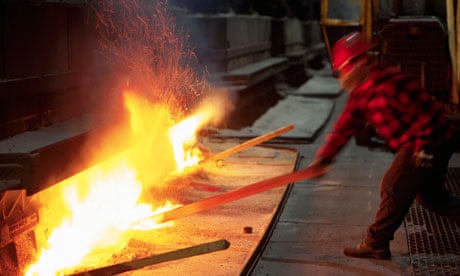Rio Tinto has become the latest multinational to blame a factory closure on new carbon taxes, after it announced that it was shutting an aluminium smelter near Newcastle upon Tyne with the loss of 515 jobs.
In a fresh blow for the hard-hit north-east England, Rio is shutting its operation at Lynemouth on the Northumberland coast, which has been an important source of employment for 40 years.
Rio said: "We were unsuccessful in finding a credible buyer for the smelter and will now close the operation after consultations with trade unions. The smelter is no longer a sustainable business because its energy costs are increasing significantly, due largely to emerging legislation."
But a union official said the new legislation, designed to reduce toxic emissions, was "a fig leaf that the company was trying to hide behind". The real motive was simply to remove "another layer of cost".
In May, Indian company Tata Steel said green taxes were a big factor in its decision to cut up to 1,500 British jobs in Scunthorpe and Teesside.
Two weeks ago, Rio announced plans to reduce its exposure to aluminium in order to concentrate on higher-margin businesses such as bauxite. A Rio insider said some of its aluminium operations failed to meet internal targets on profitability and that too much investment was needed to turn them around. Lynemouth, which employed thousands of workers in its late 1970s heyday, was one of them.
Rio, headed by Tom Albanese, told investors it wanted to sell global assets worth £5bn as it sought to restructure its aluminium division, which trades as Rio Tinto Alcan.
Rio acquired aluminium company Alcan at the height of the credit boom in 2007, with disastrous consequences. It was forced into a rescue rights issue to shore up its balance sheet as it struggled to meet its debt obligations.
John McCabe, Rio's spokesman at Lynemouth, outlined a rising cost burden as the company prepared to pay new carbon taxes to be introduced by the EU and Britain from 2013. He estimated Lynemouth's energy bill would jump from £7m to about £100m by 2015 as a result of the EU emissions trading scheme and the UK carbon price support mechanism.
The Northumberland smelter is powered by a nearby coal-fired station, also owned by Rio, which is in the process of being sold. That deal should safeguard the jobs of the station's 111 employees, said McCabe.
But Rio came under fire from the Unite union. Regional officer Bob Bolam said: "The workers are devastated. The decision will have a huge impact on the south-east Northumberland area. We are asking the company to explore all possible options to protect jobs."
A meeting between union representatives and local Lib Dem MP Sir Alan Beith is due on Thursday as part of a rearguard action to keep the smelter open.
Last month, Beith said: "Rio seems determined to concentrate its aluminium interests in areas where energy is cheaper or the regulatory regime is less tight. We have talked to them about other options but I am not sure they are serious about trying to keep Lynemouth open."
McCabe said: "Lynemouth is already a high-cost operation when you look at labour. Carbon legislation makes it worse."
Jacynthe Côté, chief executive of Rio Tinto Alcan, said: "We will work with our employees and other key stakeholders to ensure that the social and environmental consequences of today's announcement are managed in the most sensitive way.
A spokesman for the Department of Energy and Climate Change said: "This is disappointing news, but the cost of energy is an issue for businesses not just in the UK, but across Europe too. The overwhelming prime factor influencing the energy costs faced by businesses is the global wholesale price of fossil fuels.
"Where our policies do affect bills, we're acting at every turn to make them as cost-effective as possible, so we get the best bang for the consumer's buck. And we'll shortly be announcing a package of measures for those energy intensive industries for which the impact of government policy on the cost of electricity will put their international competitiveness most at risk.
"We are also committed to supporting local initiatives to identify and develop alternative opportunities that promote regional economic development."
Rio is shedding about 6,000 employees from a global workforce of more than 20,000.
